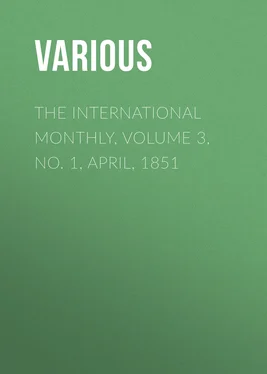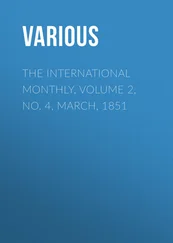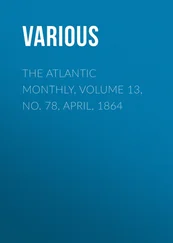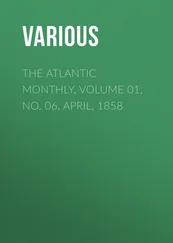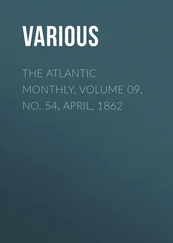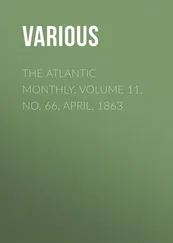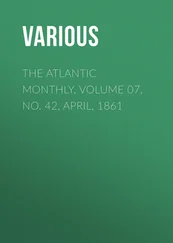Various - The International Monthly, Volume 3, No. 1, April, 1851
Здесь есть возможность читать онлайн «Various - The International Monthly, Volume 3, No. 1, April, 1851» — ознакомительный отрывок электронной книги совершенно бесплатно, а после прочтения отрывка купить полную версию. В некоторых случаях можно слушать аудио, скачать через торрент в формате fb2 и присутствует краткое содержание. Жанр: foreign_antique, periodic, foreign_edu, на английском языке. Описание произведения, (предисловие) а так же отзывы посетителей доступны на портале библиотеки ЛибКат.
- Название:The International Monthly, Volume 3, No. 1, April, 1851
- Автор:
- Жанр:
- Год:неизвестен
- ISBN:нет данных
- Рейтинг книги:3 / 5. Голосов: 1
-
Избранное:Добавить в избранное
- Отзывы:
-
Ваша оценка:
- 60
- 1
- 2
- 3
- 4
- 5
The International Monthly, Volume 3, No. 1, April, 1851: краткое содержание, описание и аннотация
Предлагаем к чтению аннотацию, описание, краткое содержание или предисловие (зависит от того, что написал сам автор книги «The International Monthly, Volume 3, No. 1, April, 1851»). Если вы не нашли необходимую информацию о книге — напишите в комментариях, мы постараемся отыскать её.
The International Monthly, Volume 3, No. 1, April, 1851 — читать онлайн ознакомительный отрывок
Ниже представлен текст книги, разбитый по страницам. Система сохранения места последней прочитанной страницы, позволяет с удобством читать онлайн бесплатно книгу «The International Monthly, Volume 3, No. 1, April, 1851», без необходимости каждый раз заново искать на чём Вы остановились. Поставьте закладку, и сможете в любой момент перейти на страницу, на которой закончили чтение.
Интервал:
Закладка:
"If thy neighbor should sin, old Christoval said,
Never, never, unmerciful be!
For remember it is by the mercy of God,
Thou art not as wicked as he!" 11
MARY WOLSTONECRAFT SHELLEY
The daughter of William Godwin and Mary Wolstonecraft, and wife of Percy Bysshe Shelley, died at the age of fifty-three, in Chester Square, Pimlico, London, on the first day of February. What woman had ever before relations so illustrious! Daughter of Godwin and wife of Shelley! These few words unfold a remarkable history, unparalleled, and unapproached in romantic dignity. In the dedication to her of the noble poem of The Revolt of Islam , Shelley says:
"They say that thou wert lovely from thy birth,
Of glorious parents, thou aspiring Child.
I wonder not—for One then left this earth
Whose life was like a setting planet mild,
Which clothed thee in the radiance undefiled
Of its departing glory; still her fame
Shines on thee, through the tempests dark and wild
Which shake these latter days; and thou canst claim
The shelter, from thy Sire, of an immortal name."
In the introduction to one of her novels, she herself says of her youth:
"It is not singular that, as the daughter of two persons of distinguished literary celebrity, I should very early in life have thought of writing. As a child I scribbled; and my favorite pastime, during the hours given me for recreation, was to 'write stories.' Still I had a dearer pleasure than this, which was the formation of castles in the air—the indulging in waking dreams—the following up trains of thought, which had for their subject the formation of a succession of imaginary incidents. My dreams were at once more fantastic and agreeable than my writings. In the latter I was a close imitator—rather doing as others had done, than putting down the suggestions of my own mind. What I wrote was intended at least for one other eye—my childhood's companion and friend; but my dreams were all my own; I accounted for them to nobody; they were my refuge when annoyed—my dearest pleasure when free. I lived principally in the country as a girl, and passed a considerable time in Scotland. I made occasional visits to the more picturesque parts; but my habitual residence was on the blank and dreary northern shores of the Tay, near Dundee. Blank and dreary on retrospection I call them: they were not so to me then. They were the eyry of freedom, and the pleasant region where unheeded I could commune with the creatures of my fancy. I wrote then—but in a most common-place style. It was beneath the trees of the grounds belonging to our house, or on the bleak sides of the woodless mountains near, that my true compositions, the airy flights of my imagination, were born and fostered. I did not make myself the heroine of my tales. Life appeared to me too common-place an affair as regarded myself. I could not figure to myself that romantic woes or wonderful events would ever be my lot; but I was not confined to my own identity, and I could people the hours with creations far more interesting to me at that age, than my own sensations."
Her connection with Shelley commenced in 1815, and she gives this account of the following year, in which she wrote her famous novel, Frankenstein :
"After this my life became busier, and reality stood in place of fiction. My husband, however, was from the first, very anxious that I should prove myself worthy of my parentage, and enrol myself on the page of fame. He was for ever inciting me to obtain literary reputation, which even on my own part I cared for then, though since I have become infinitely indifferent to it. At this time he desired that I should write, not so much with the idea that I could produce any thing worthy of notice, but that he might himself judge how far I possessed the promise of better things hereafter. Still I did nothing. Travelling, and the cares of a family, occupied my time; and study, the way of reading, or improving my ideas in communication with his far more cultivated mind, was all of literary employment that engaged my attention. In the summer of 1816, we visited Switzerland, and became the neighbors of Lord Byron. At first we spent our pleasant hours on the lake, or wandering on its shores: and Lord Byron, who was writing the third canto of Childe Harold, was the only one among us who put his thoughts upon paper. These, as he brought them successively to us, clothed in all the light and harmony of poetry, seemed to stamp as divine the glories of heaven and earth, whose influences we partook with him. But it proved a wet, ungenial summer, and incessant rain often confined us for days to the house. Some volumes of ghost stories, translated from the German into French, fell into our hands. There was the History of the Inconstant Lover, who when he thought to clasp the bride to whom he had pledged his vows, found himself in the arms of the pale ghost of her whom he had deserted. There was the tale of the sinful founder of his race, whose miserable doom it was to bestow the kiss of death on all the younger sons of his fated house, just when they reached the age of promise. His gigantic, shadowy form, clothed like the ghost in Hamlet, in complete armor, but with the beaver up, was seen at midnight, by the moon's fitful beams, to advance slowly along the gloomy avenue. The shape was lost beneath the shadow of the castle walls; but soon a gate swung back, a step was heard, the door of the chamber opened, and he advanced to the couch of the blooming youths, cradled in healthy sleep. Eternal sorrow sat upon his face as he bent down and kissed the forehead of the boys, who from that hour withered like flowers snapt upon the stalk. I have not seen these stories since then; but their incidents are as fresh in my mind as if I had read them yesterday. 'We will each write a ghost story,' said Lord Byron; and his proposition was acceded to. There were four of us. The noble author began a tale, a fragment of which he printed at the end of his poem of Mazeppa. Shelley, more apt to embody ideas and sentiments in the radiance of brilliant imagery, and in the music of the most melodious verse that adorns our language, than to invent the machinery of a story, commenced one founded on the experiences of his early life. Poor Polidori had some terrible idea about a skull-headed lady, who was so punished for peeping through a key-hole—what to see I forget—something very shocking and wrong of course; but when she was reduced to a worse condition than the renowned Tom of Coventry, he did not know what to do with her, and was obliged to dispatch her to the tomb of the Capulets, the only place for which she was fitted. The illustrious poets also, annoyed by the platitude of prose, speedily relinquished their uncongenial task.
"I busied myself to think of a story ,—a story to rival those which had excited us to this task. One which would speak to the mysterious fears of our nature, and awaken thrilling horror—one to make the reader dread to look around, to curdle the blood, and quicken the beatings of the heart. If I did not accomplish these things, my ghost story would be unworthy of its name. I thought and pondered—vainly. I felt that blank incapability of invention which is the greatest misery of authorship, when dull Nothing replies to our anxious invocations. Have you thought of a story? I was asked each morning, and each morning I was forced to reply with a mortifying negative. Every thing must have a beginning, to speak in Sanchean phrase; and that beginning must be linked to something that went before. The Hindoos give the world an elephant to support it, but they make the elephant stand upon a tortoise. Invention, it must be humbly admitted, does not consist in creating out of void, but out of chaos; the materials must, in the first place, be afforded: it can give form to dark, shapeless substances, but cannot bring into being the substance itself. In all matters of discovery and invention, even of those that appertain to the imagination, we are continually reminded of the story of Columbus and his egg. Invention consists in the capacity of seizing on the capabilities of a subject, and in the power of moulding and fashioning ideas suggested to it. Many and long were the conversations between Lord Byron and Shelley, to which I was a devout but nearly silent listener. During one of these, various philosophical doctrines were discussed, and among others the nature of the principle of life, and whether there was any probability of its ever being discovered and communicated. They talked of the experiments of Dr. Darwin (I speak not of what the Doctor really did, or said that he did, but, as more to my purpose, of what was then spoken of as having been done by him), who preserved a piece of vermicelli in a glass case, till by some extraordinary means it began to move with voluntary motion. Not thus, after all, would life be given. Perhaps a corpse would be re-animated; galvanism had given token of such things: perhaps the component parts of a creature might be manufactured, brought together, and endued with vital warmth. Night waned upon this talk; and even the witching hour had gone by, before we retired to rest. When I placed my head upon my pillow, I did not sleep, nor could I be said to think. My imagination, unbidden, possessed and guided me, gifting the successive images that arose in my mind with a vividness far beyond the usual bounds of reverie. I saw—with shut eyes, but acute mental vision—I saw the pale student of unhallowed arts kneeling beside the thing he had put together. I saw the hideous phantasm of a man stretched out, and then on the working of some powerful engine, show signs of life, and stir with an uneasy, half vital motion. Frightful must it be; for supremely frightful would be the effect of any human endeavor to mock the stupendous mechanism of the Creator of the world. His success would terrify the artist; he would rush away from his odious handywork, horror-stricken. He would hope that, left to itself, the slight spark of life which he had communicated would fade; that this thing, which had received such imperfect animation, would subside into dead matter; and he might sleep in the belief that the silence of the grave would quench for ever the transient existence of the hideous corpse which he had looked upon as the cradle of life. He sleeps; but he is awakened; he opens his eyes; behold the horrid thing stands at his bedside, opening his curtains, and looking on him with yellow, watery, but speculative eyes.
Читать дальшеИнтервал:
Закладка:
Похожие книги на «The International Monthly, Volume 3, No. 1, April, 1851»
Представляем Вашему вниманию похожие книги на «The International Monthly, Volume 3, No. 1, April, 1851» списком для выбора. Мы отобрали схожую по названию и смыслу литературу в надежде предоставить читателям больше вариантов отыскать новые, интересные, ещё непрочитанные произведения.
Обсуждение, отзывы о книге «The International Monthly, Volume 3, No. 1, April, 1851» и просто собственные мнения читателей. Оставьте ваши комментарии, напишите, что Вы думаете о произведении, его смысле или главных героях. Укажите что конкретно понравилось, а что нет, и почему Вы так считаете.
